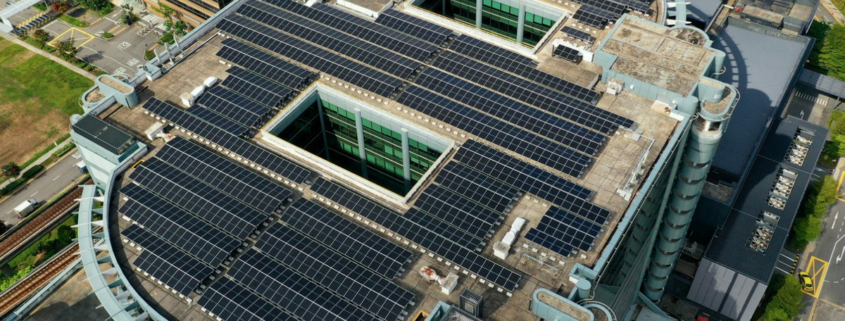SingPost Completes Rooftop Solar Panel Installation at S$1.1 Billion SingPost Centre

Singapore Post Limited (SingPost), a postal and eCommerce logistics provider in the Asia-Pacific region, announced the completion of a 995 kilowatt-peak (kWp) solar energy power system atop SingPost Centre, executed in collaboration with Sembcorp Solar Singapore.
Expanding the Group’s Solar Energy Footprint
SingPost Centre, located at 10 Eunos Road 8, is a prominent mixed-use development valued at S$1.1 billion as of 31 March 2024. The centre features a retail mall with a gross floor area of 269,000 square feet and more than 500,000 square feet of prime office space.
The newly installed rooftop solar photovoltaic panels are expected to generate around 1,150,000 kWh annually. The amount of renewable energy generated by these solar panels can power approximately 271 four-room public housing units in Singapore for a year1. The solar energy generated will come with Renewable Energy Certificates (RECs), which SingPost can use to abate its Scope 2 carbon emissions.
“As a mixed-use development comprising retail spaces, commercial offices and our operational centres, SingPost Centre’s annual electricity consumption is significant, given the diverse needs of our tenants and our own operations. While many other energy efficiency initiatives have been implemented over the years, the PV panels installation is important as it introduces an on-site renewable energy source to reduce reliance on brown energy and inspires similar renewable energy retrofits in other existing large, mixed-use facilities,” said Lee Eng Keat, Head of Strategy, Communications, and Property at SingPost.
This installation at SingPost Centre builds upon SingPost’s previous successes in harnessing solar energy. At the company’s Regional eCommerce Logistics Hub at Tampines Logistics Park, solar panels installed by Sembcorp Solar generate about 25 percent of the building’s total annual electricity consumption2, equivalent to the energy usage of approximately 321 four-room public housing units in Singapore per year.
Commenting on the collaboration, Lai Mun Dart, General Manager (Renewables Business) from Sembcorp Solar Singapore said, “We are pleased to be SingPost’s green energy partner once again, supporting them in their ongoing sustainability efforts. This project is a prime example of how we can retrofit existing older building structures to be transformed into energy-efficient assets. The collaboration also marks another important step forward in our shared commitment to driving energy transition in Singapore and actively contributing to our nation’s renewables goals.”
Greater Energy Efficiency Across its Properties
SingPost has implemented various energy efficiency upgrades across its properties, including improvements to its air-conditioning and mechanical ventilation (ACMV) systems and replacing lighting with energy-efficient Light Emitting Diodes (LED) alternatives. These efforts have led to recognition such as the Singapore Building and Construction Authority (BCA) Green Mark Gold Plus award for SingPost Centre (Commercial) under the Green Mark for Existing Non-Residential Buildings (ENRB:2017) criteria.
The company has set targets to achieve net zero (Scope 1 and 2) carbon emissions for its Singapore operations by 2030 and net zero (Scope 1, 2 and 3) for its global operations by 20503. As part of its decarbonisation roadmap, it is also exploring options to expand the use of renewable energy across its operations including its new facilities in Australia.
1The Singapore Energy Statistics 2023 stated that the average 4-room public housing units consumed 353.3 kWh/month as at June 2023.
2SingPost Sustainability Report 2023/24. RESET FOR SUSTAINABLE GROWTH
3This applies to Singapore and International operations. For Australia operations, this target is currently under review, in consideration of recent business acquisition.
Image Credit: Sembcorp Solar Singapore



